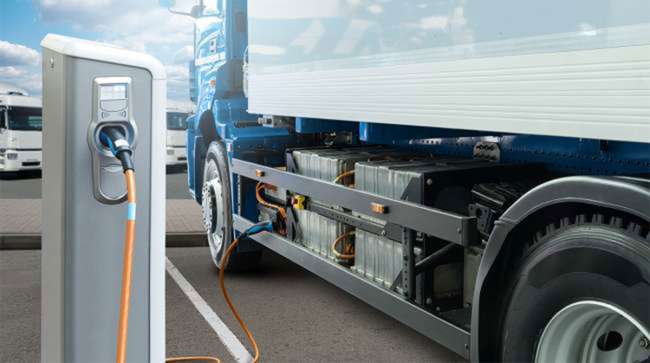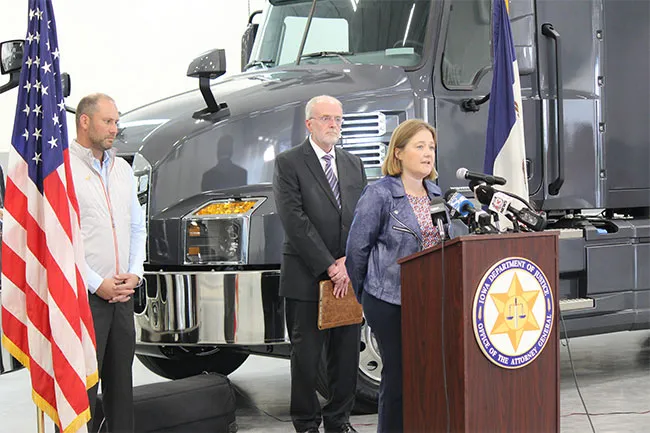Staff Reporter
Nebraska Leads State Groups in EPA, CARB Emissions Lawsuits

[Stay on top of transportation news: Get TTNews in your inbox.]
Frustrated with a wave of forthcoming heavy-truck emissions regulations, Nebraska is leading two state coalitions suing California and the U.S. Environmental Protection Agency over their individual emissions rules.
“California and an unaccountable EPA are trying to transform our national trucking industry and supply chain infrastructure,” declared Nebraska Attorney General Mike Hilgers. “Neither California nor the EPA has the constitutional power to dictate these nationwide rules to Americans.”
He predicted that the California and federal emissions regulations will “devastate the trucking and logistics industry, raise prices for customers and impact untold number of jobs across Nebraska and the country” — especially at a time of greater inflation and a strained U.S. electric power grid, he said.
The largest coalition includes 24 states that on May 13 filed a petition for review in the U.S. Court of Appeals for the D.C. Circuit taking aim at EPA’s “Greenhouse Gas Emissions Standards for Heavy-Duty Vehicles-Phase 3.”
Asking the court to declare unlawful and vacate the EPA’s regulation are Nebraska, Alabama, Alaska, Arkansas, Florida, Georgia, Idaho, Indiana, Iowa, Kansas, Kentucky, Louisiana, Mississippi, Missouri, Montana, Oklahoma, South Carolina, South Dakota, Tennessee, Texas, Utah, Virginia, West Virginia and Wyoming. They called the EPA’s regulation for heavy trucks “arbitrary, capricious, an abuse of discretion” and without legal authority.
Hilgers accused the EPA of “imposing stringent tailpipe emissions standards for heavy-duty vehicles that effectively forces manufacturers to produce more electric trucks and fewer internal-combustion trucks. Right now, electric trucks — and the infrastructure needed to support them — are virtually nonexistent.”
Kentucky Attorney General Russell Coleman said most diesel-powered semi-trucks have a range of up to 2,000 miles compared to a high-performing electric semi-truck’s 500-mile range. Plus, EV trucks can take three hours to fully charge and cost twice as much as diesel counterparts, he said.

Iowa Attorney General Brenna Bird announces the suit against CARB. (Iowa Attorney General)
“The Kentucky Department of Agriculture relies on heavy-duty vehicles to tow trailers and check heavy-capacity scales to ensure the integrity of Kentucky’s commerce. The Biden administration is out of touch with the needs of hardworking people but also the way of life in our Kentucky communities,” said state Agriculture Commissioner Jonathan Shell.
Montana Attorney General Austin Knudsen, who has filed 49 lawsuits against Biden administration policies, called electric trucks inefficient, expensive and harmful to the state’s citizens since eliminating diesel trucks will result in higher prices for goods and interstate transportation, while straining the electricity grid.
The companion California lawsuit was filed in Sacramento in the U.S. District Court for the Eastern District of California as a “complaint for declaratory judgment and an injunction” against the state and its California Air Resources Board. The action against California includes Alabama, Arkansas, Georgia, Idaho, Indiana, Iowa, Kansas, Louisiana, Missouri, Montana, Oklahoma, South Carolina, Utah, West Virginia and Wyoming along with the Arizona State Legislature and Nebraska Trucking Association.
The 42-page document repeatedly outlines potential damages to the group that will flow from California’s Advanced Clean Fleets regulation. Specifically, the coalition said the law violates the U.S. Constitution by overriding federal law and that it “masquerades” as a state regulation that in practice “exports” beyond its borders, particularly due to the national significance of its key West Coast ports.
We are leading multi-state coalitions in two lawsuits to stop both the Biden Administration & the State of California from imposing electric-vehicle mandates on truck owners & operators throughout the country @TeamPillen @nebraskatrucker More: https://t.co/uSQtFbevfr pic.twitter.com/iriegVgc4z — Nebraska Attorney General Mike Hilgers (@NEAttorneyGen) May 13, 2024
“It is a misconceived and nationwide policy executed without the blessing of Congress or the consent of elected leaders in affected states,” the suit contends. “Any covered truck fleet owner who refuses to comply is penalized with denial of access to California, the nation’s largest state economy and a hub for international trade. Advanced Clean Fleets also forces truck manufacturers to make fewer of the internal-combustion trucks that truck owners want to buy. Those businesses are also prohibited from doing business in California if they do not comply.”
Furthermore, the lawsuit alleges the California regulations will cause financial harm.
“Is it realistic that out-of-state companies — just driving through the state — would need an electric truck that costs $400,000 before the costs of installing chargers?” asked Alabama Attorney General Steve Marshall. “This will result in huge costs for all companies and further strain our supply chain, which will affect all of our personal finances.”
“One out of 13 Iowans works in trucking,” added Iowa Attorney General Brenna Bird. “I am suing to hit the brakes on California’s unrealistic electric-semi mandate that will kill jobs, crush our supply chain, hurt farmers and wipe out the American trucking industry as we know it. California does not get to tell Iowa truckers what to do.”
Want more news? Listen to today's daily briefing above or go here for more info
Nebraska Trucking Association President Kent Grisham said, “We are moving freight like never before, and we’re doing so with diesel-engine trucks that are at near-zero emissions. No other industry is making so much progress so quickly. What we don’t need are politically motivated mandates that will actually set our efforts back.”
Alabama Trucking Association President and CEO Mark Colson also backed his state’s legal fights: “Unachievable electric truck mandates set our local trucking industry and Alabama consumers up for failure. Rather than forcing a one-size-fits-all approach of unrealistic targets and timelines, we should have policies that embrace innovation and an all-of-the-above strategy to build on the trucking industry’s successful track record of reducing emissions.”




